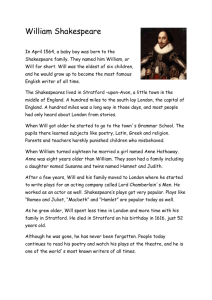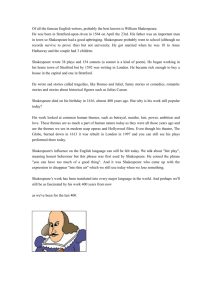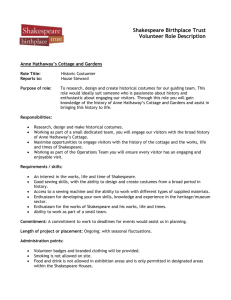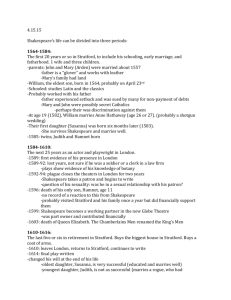'Let me not to the marriage of true minds (Sonnet CXVI)'
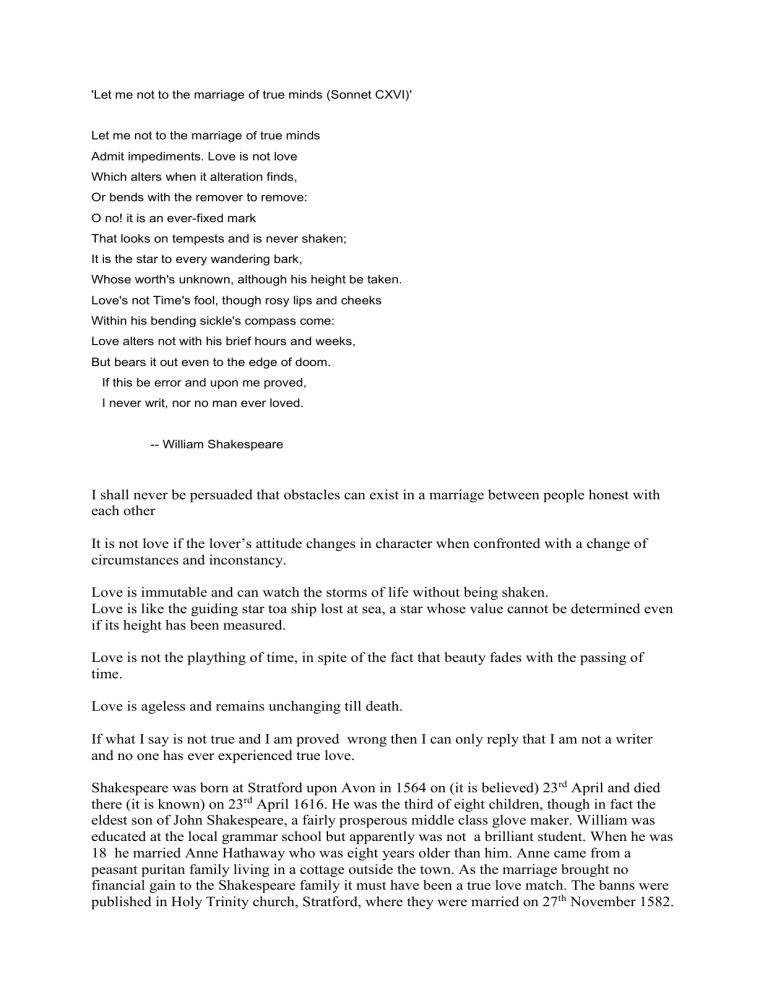
'Let me not to the marriage of true minds (Sonnet CXVI)'
Let me not to the marriage of true minds
Admit impediments. Love is not love
Which alters when it alteration finds,
Or bends with the remover to remove:
O no! it is an ever-fixed mark
That looks on tempests and is never shaken;
It is the star to every wandering bark,
Whose worth's unknown, although his height be taken.
Love's not Time's fool, though rosy lips and cheeks
Within his bending sickle's compass come:
Love alters not with his brief hours and weeks,
But bears it out even to the edge of doom.
If this be error and upon me proved,
I never writ, nor no man ever loved.
-- William Shakespeare
I shall never be persuaded that obstacles can exist in a marriage between people honest with each other
It is not love if the lover’s attitude changes in character when confronted with a change of circumstances and inconstancy.
Love is immutable and can watch the storms of life without being shaken.
Love is like the guiding star toa ship lost at sea, a star whose value cannot be determined even if its height has been measured.
Love is not the plaything of time, in spite of the fact that beauty fades with the passing of time.
Love is ageless and remains unchanging till death.
If what I say is not true and I am proved wrong then I can only reply that I am not a writer and no one has ever experienced true love.
Shakespeare was born at Stratford upon Avon in 1564 on (it is believed) 23 rd
April and died there (it is known) on 23 rd April 1616. He was the third of eight children, though in fact the eldest son of John Shakespeare, a fairly prosperous middle class glove maker. William was educated at the local grammar school but apparently was not a brilliant student. When he was
18 he married Anne Hathaway who was eight years older than him. Anne came from a peasant puritan family living in a cottage outside the town. As the marriage brought no financial gain to the Shakespeare family it must have been a true love match. The banns were published in Holy Trinity church, Stratford, where they were married on 27 th November 1582.
Six months later, on 26 th
May 1583, their first child Susanna was born and on 2 nd
February
1585 Anne gave birth to twins, Judith and Hamnet. Later that same year Shakespeare must have caused a local scandal when he went to live and work in London, leaving his wife and three young children in Stratford. Perhaps Anne insisted on a puritan upbringing for her children: they were given typically puritan first names. Puritans equated the theatre with vice and perdition. Whatever the reasons Anne did not follow her husband to London, but remained in Stratford. He seems to have quickly established himself in the London theatrical scene and must have had many rich patrons and women admirers. He eventually helped to found the globe theatre – incidentally it was not until 1660 that women played feminine roles; before that, these parts were taken by boys. However, although Shakespeare had left his family he never abandoned them. After his only son Hamnet died in 1595 Shakespeare took even greater care of his family, buying a house at Stratford and renovating it for his wife and daughters to live in; it was called “New Place” and was the second largest residence in the
Strafford area. In his tragedies Shakespeare often mourns the death of young people. He himself returned to live in Stratford permanently from 1612 until his death, as one of the richest and most respectable citizens: he was accorded the distinction of being buried in the local parish church (the local scandal of 1585 had conveniently been forgotten). On his tombstone was written: “Blessed be the man that spares these stones, cursed be the man that moves my bones”. His daughters received the larger share of his inheritance; his wife, as was the custom in those days received only a minor share of his considerable wealth but sufficiently to enable her to live in comfort until her death on 6 th
august 1623.
In answering the following questions, imagine events in Shakespeare’s life that “bear out” phrases from his sonnet 116:
1.
what impediments to ha happy marriage may there have been between himself and
Anne Hathaway?
2.
what alteration is found in his family life soon after he got married?
3.
whom may he have met as removers to bend and remove his love for Anne?
4.
what tempests did he experience in his private life?
5.
what was his star ?
6.
when may he have thought he was a wandering bark ?
7.
Anne Shakespeare was 56 years old in 1612. How had her “rosy lips and cheeks come within the compass of (old father) time’s bending sickle”?
8.
nevertheless Shakespeare’s “love alters not eve’n to the edge of doom”, or did it?
Explain.
9.
what did he mean by “if this be error … I never writ”?
